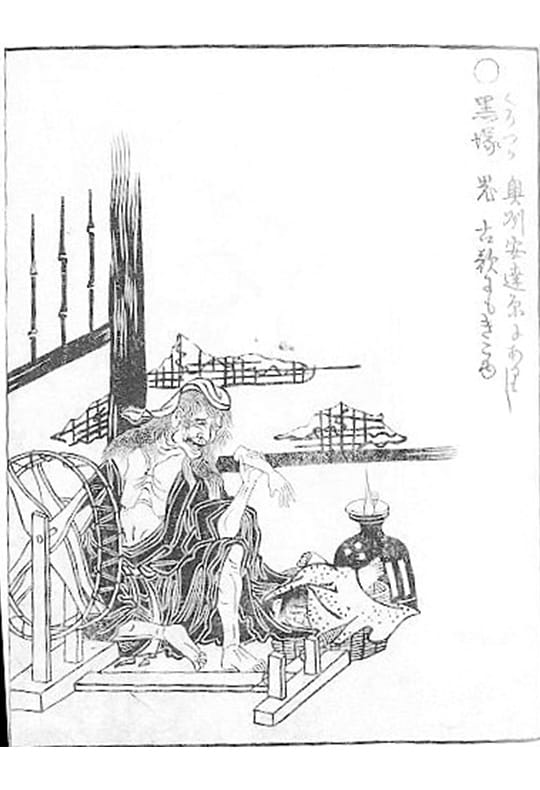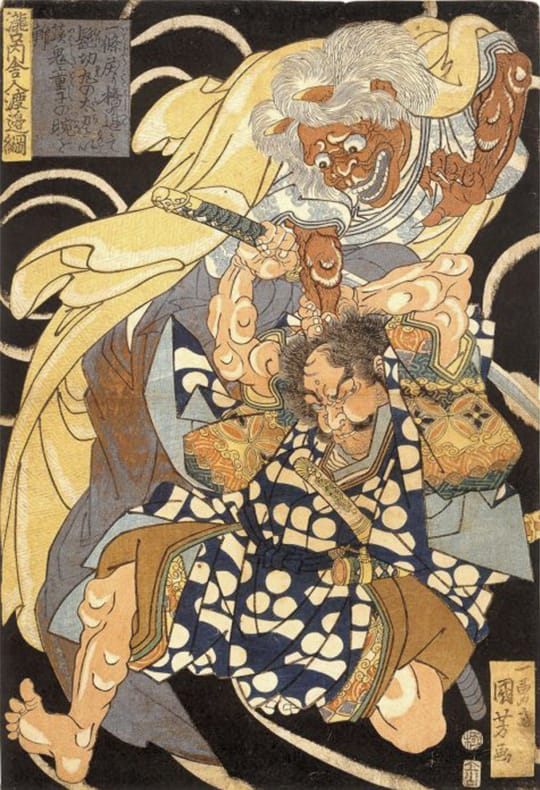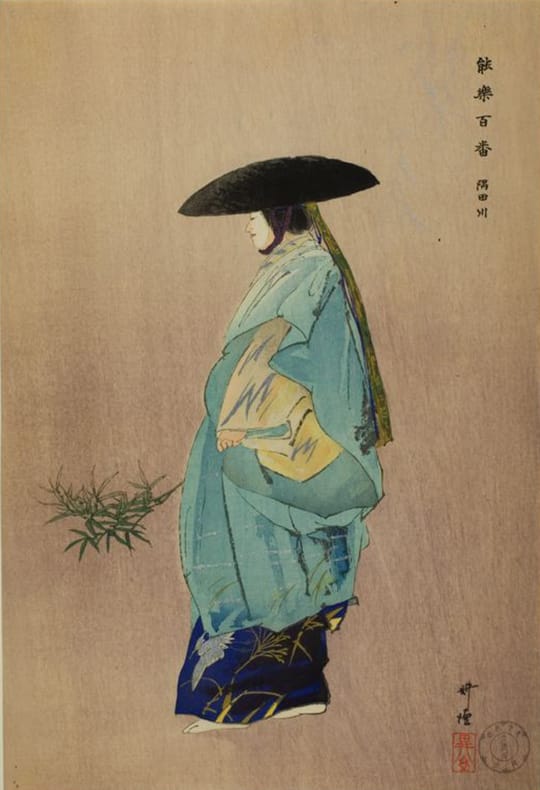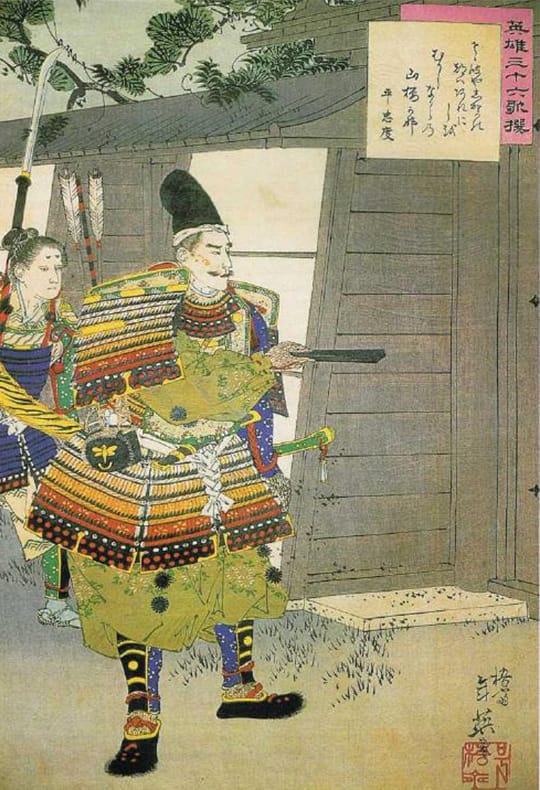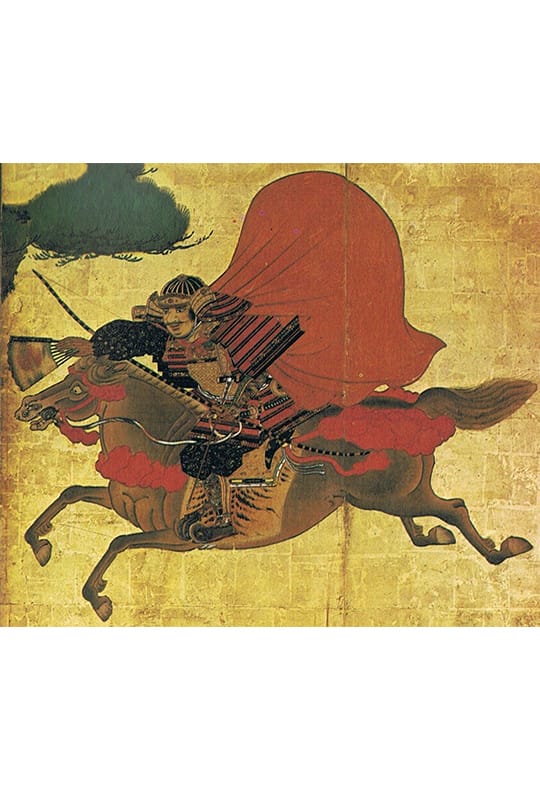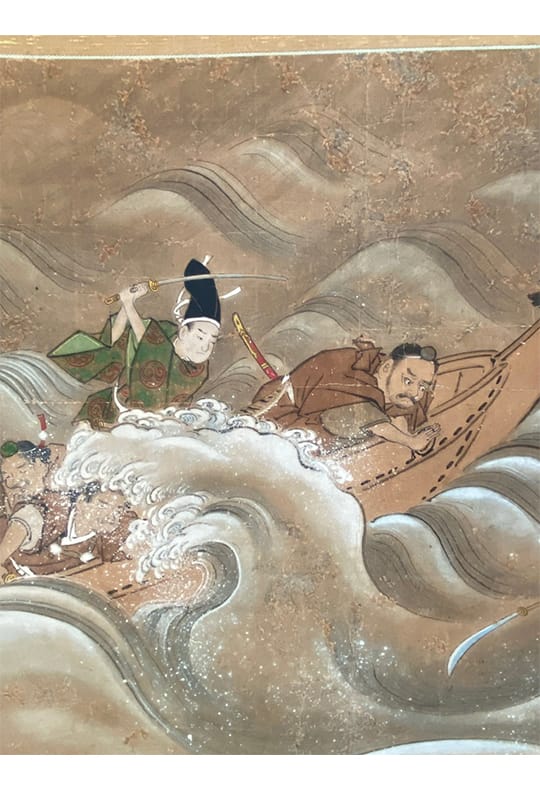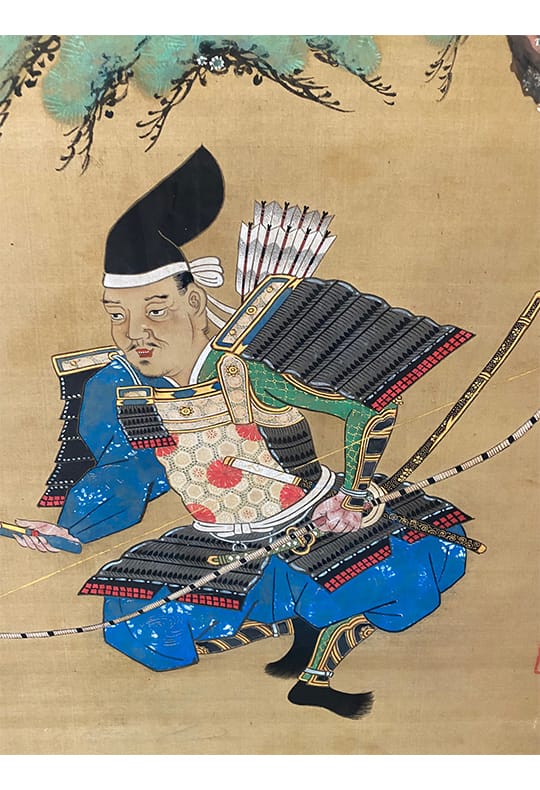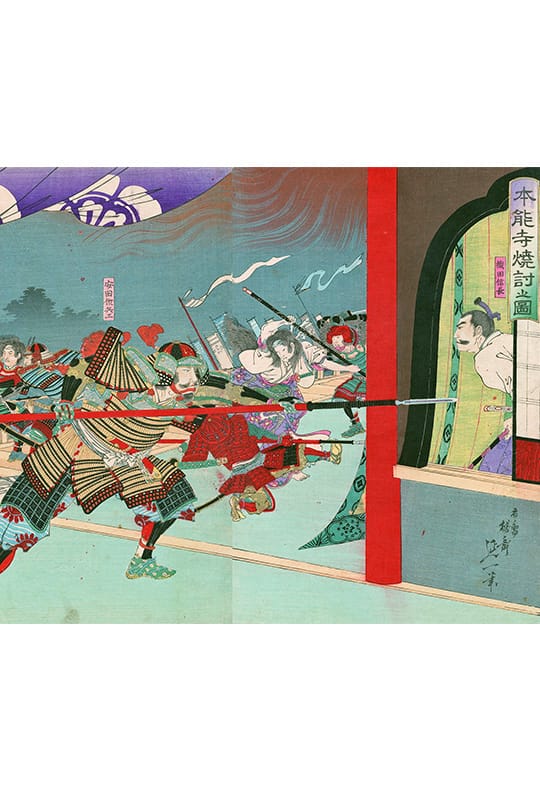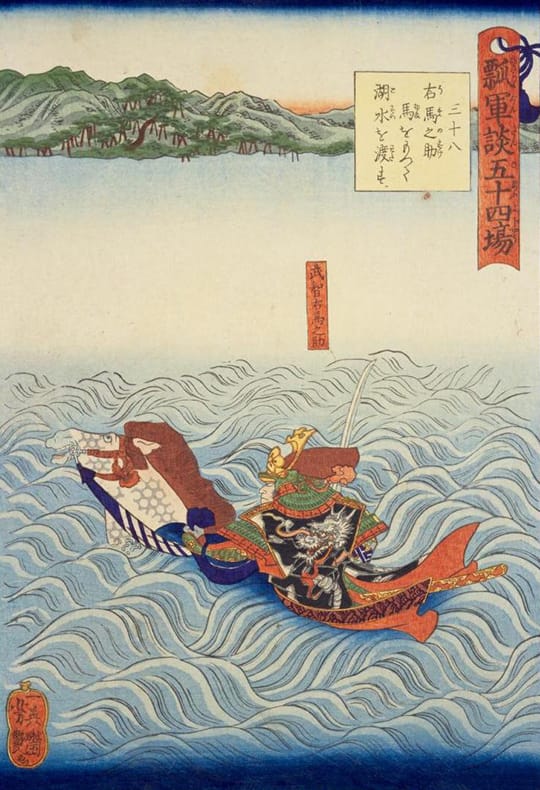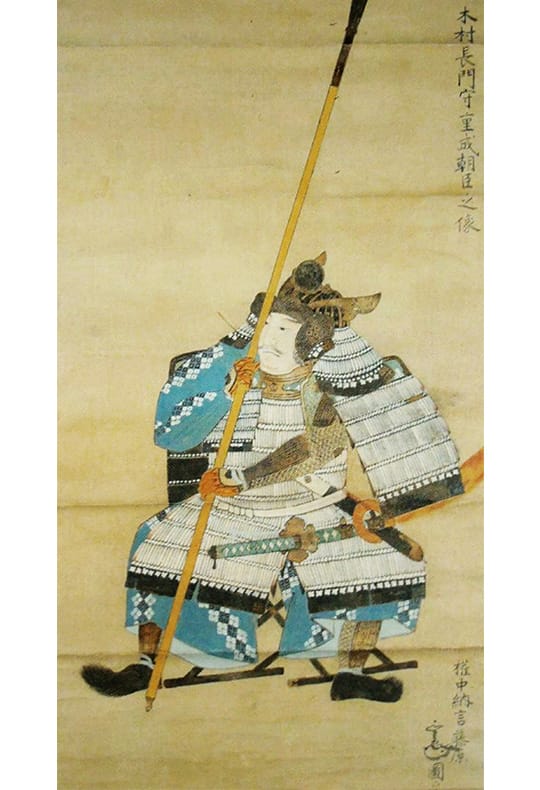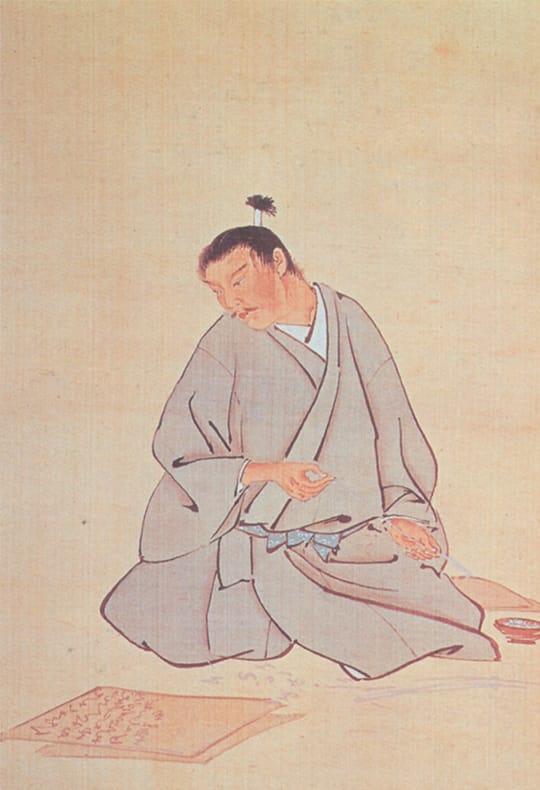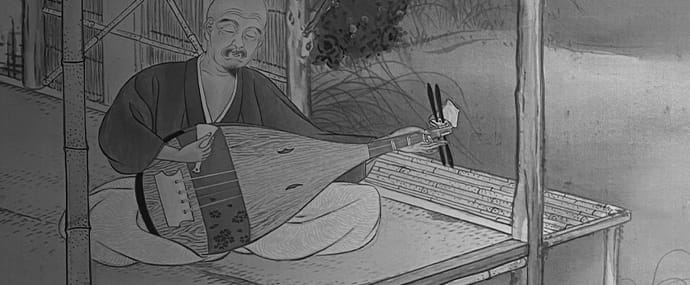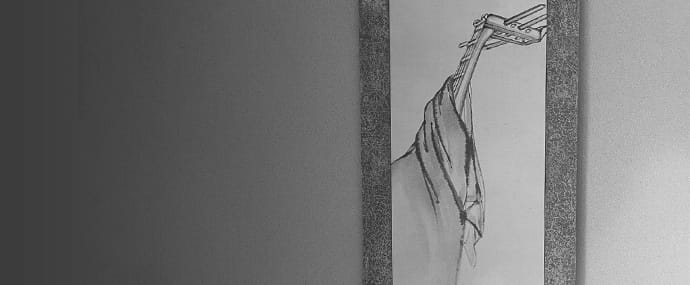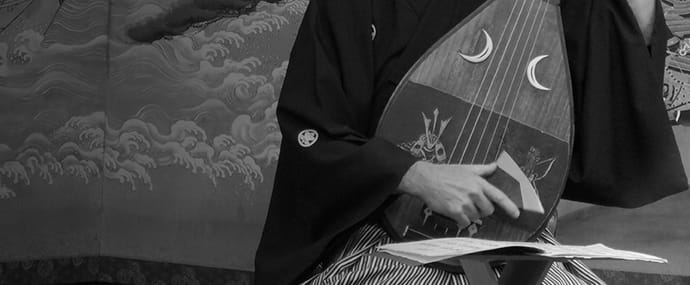Kyoto-search

ibaraki
茨木
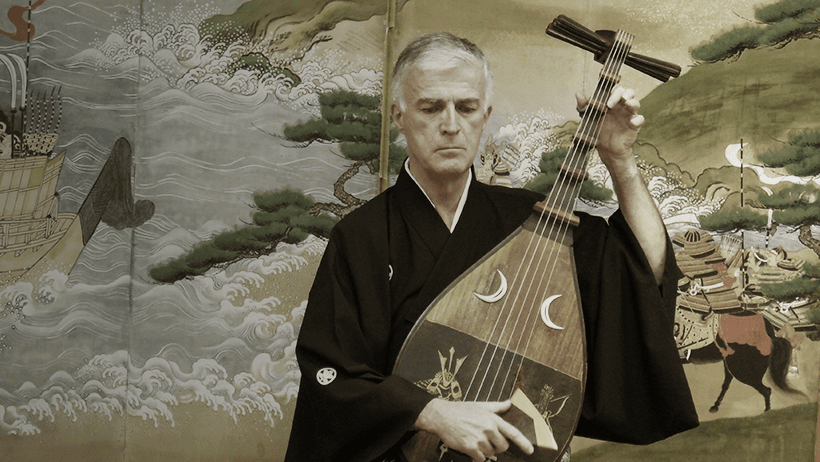
Introduction
Ibaraki is the sequel to Rashōmon. At the end of both the Noh play Rashōmon and the biwa piece, WATANABE no Tsuna has cut off the arm of the demon Ibaraki. In several sources (the Tsurugi no maki of the Yashirobon version of The Tale of the Heike, and the Zen taiheiki), the story continues with the demon, disguised as WATANABE’s aunt, visiting WATANABE at his enclosure and taking back his severed arm. In 1869, this part of the story became an independent nagauta piece called Tsunayakata. In 1883, KAWATAKE Mokuami created the Kabuki dance piece Ibaraki, which today is the best-known version of the story.
In the Asahikai biwa repertoire, the piece is called Tsunayakata. In this text many lines are close to or identical with the nagauta piece, Tsunayakata.
Synopsis
WATANABE no Tsuna, MINAMOTO no Raikō’s retainer, became famous after cutting off the arm of the demon, Ibaraki, at the Rashōmon Gate, the southern main entrance to Kyōto (see Rashōmon). At the end of Rashōmon, the demon howls that in due time, he will retrieve his arm, and then flees in the direction of Mount Atago.
After this remarkable deed at the Rashōmon Gate, the renowned diviner, ABE no Seimei, warns Tsuna that the demon will return within seven days to reclaim his arm. ABE admonishes Tsuna to confine himself indoors, secure all the entrances, and forbid anybody from entering his house. The text for the piece begins on the seventh and last evening, when Tsuna is suffering from the loneliness of his self-imposed isolation. In the quiet light of the moon, an elderly woman suddenly appears. She knocks at the gates of Tsuna’s manor, and, introducing herself as his aunt (i.e. nurse), asks to visit him. Tsuna tells her to come the next day and sends her away. She complains of her long journey and the lack of welcome for one as feeble as she. Tsuna succumbs to his mounting guilt and invites her to enter as his guest. After the obligatory greetings have been exchanged, she asks Tsuna about the skirmish at the Rashōmon Gate that has made him so famous. She then expresses a deep curiosity to know where the arm is secreted and begs to see it. When Tsuna finally shows her the arm in its Chinese chest, rage suffuses her face. The creases and wrinkles of anger become more and more pronounced until the aunt reverts to her true form as the demon. Naming herself as Ibaraki, the demon bellows insults at Tsuna, seizes the arm, and crashes through the roof in her flight.

Lyrics
-
1. As night deepens in the streets of the Capital Dunkel sind die Straßen in der Hauptstadt;
Miyako ōji no yo wa fukete 都大路の夜は更けて
-
2. and all slumber in its depths, Bäum‘ und Büsche ruhen.
kusaki mo nemuru ushimitsu no 草木も眠る丑満の
-
3. the sound of a temple bell ruptures the quiet Eine Glocke reißt die Stille
shizukesa yaburu kane no oto 静けさ破る鐘の音
-
4. echoing in the shadows of dark. und verklingt in tiefer Nacht.
in ni komorite hibiku nari 陰に籠りて響くなり
-
5. As for WATANABE no Tsuna, Da hat doch neulich WATANABE no Tsuna
satemo WATANABE no Genji Tsuna wa さても渡辺の源次綱は
-
6. who at the Rashōmon Gate on Ninth Avenue in der Neunten Straße vor dem Tore Rashōmon
miyako no Kujō Rashōmon nite 都の九条羅生門にて
-
7. lopped off the demon’s arm, eines Dämons Hand gehauen.
kijin no kaina o kiritorite 鬼神の腕を切り取りて
-
8. his name resounds throughout the world. Hoch gelobt wird er in aller Welt.
bumei tenka ni agekeru ga 武名天下にあげけるが
-
9. “Within seven days, the spite-driven demon „Doch solch ein Dämon wird bestimmt
kakaru akki wa nanuka no uchi ni かゝる悪鬼は七日の内に
-
10. unfailingly will take his revenge,” in sieben Tagen Rache üben”;
kanarazu ada o nasu nari to 必ず仇をなすなりと
-
11. ABE no Seimei forewarned. dies verkündete der Seher ABE no Seimei.
ABE no Seimei ga kanmon ni yori 阿部の晴明が勘文により
-
12. Tsuna thus secluded himself So zog denn Tsuna sich zurück
Tsuna wa hisoka ni monoimi shite 綱はひそかに物忌して
-
13. to recite the Ninnō sutra und sang tagein tagaus das Ninnō-Sutra,
ninnōkyō o dokuju nashi 仁王経を読誦なし
-
14. and locked the gates behind him. während er die Pforten seines Hauses fest verschlossen hielt.
mon o tojite zo itarikeru 門を閉ぢてぞゐたりける
-
15. This evening is the last of the seven days, Das Ende der Klausur ist nah,
sude ni koyoi wa nanukame no 既に今宵は七日目の
-
16. and the fell period is to end. denn heute ist der siebte Abend.
imiake no yo to nari nureba 忌明の夜となりぬれば
-
17. Suffering from the tedium, Tsuna fühlt trotz heldischer Gesinnung
mono ni koraenu gōyū no ものにこらへぬ剛勇の
-
18. Tsuna’s frustration and Überdruss in seiner Einsamkeit.
Tsuna wa isasaka umi gokochi 綱はいさゝか倦み心地
-
19. sense of unease from the seclusion. Ach, er ist es leid, allein zu sein,
ara kizumari no monoimi ya to あら気づまりの物忌やと
-
20. have left him weary and bored. die Stunden sind ihm lang.
shozai nage nizo mienikeru 所在なげにぞ見えにける
-
21. In the aftermath of a gentle rain, Nach einem kurzen Regenschauer
hito murasame no furi sugite 一と村雨の降り過ぎて
-
22. as the moon shrouded in mist wird es auf den Straßen still.
hisokesa masaru chimataji ni ひそけさまさる巷路に
-
23. glimmers over the quiet streets, Der Mond verbirgt sich hinter Schleiern –
tsuki wa oboro ni shiraginu no 月はおぼろに白絹の
-
24. an ancient woman in a white robe ist da nicht ein altes Weib, in einem weißen Seidenmantel?
uchikake kitaru hitori no rōba 打掛着たる一人の老婆
-
25. appears from nowhere Plötzlich ist sie da, woher sie kam, das weiß niemand –
izuku to mo naku arawarete いづくともなく現れて
-
26. and knocks at the gate. sie klopft ans Tor ganz leise.
kado hotohoto to uchitataku 門ほとほとと打叩く
-
27. Tsuna suspicions were aroused when he heard the knocking. Tsuna hört’s und wundert sich.
kiku yori Tsuna wa ibukashimi 聞くより綱はいぶかしみ
-
28. “On this night of all nights, „Wer will denn noch zu dieser Stunde
kakaru yofuke ni waga kado o かゝる夜更にわが門を
-
29. what manner of person could be calling?” Einlass hier begehren?“
otozure tamō wa nanibito zo おとづれ給ふは何人ぞ
-
30. “I have come a great distance, „Von dem Dorfe Watanabe in der Settsu Gegend
kore wa Tsu no kuni Watanabe no sato yori これは津の国渡辺の里より
-
31. all the way from Watanabe Village in Settsu. führte mich der Weg zu Euch,
harubaru tazune kitari taru はるばる訪ね来りたる
-
32. It is I, your aunt (i.e. nurse). Ich bin es, Eure Tante (d.h. Amme),
wadono ga oba ni sōrō yo 和殿が伯母に候よ
-
33. Please open the gate,” she said. öffnet mir das Tor.“
kono mon hiraki tamae ya to 此の門ひらき給へやと
-
34. Hearing this, Tsuna raised his voice and said, So bittet sie, doch Tsuna ruft mit lauter Stimme:
iwarete Tsuna wa koe takaku 言はれて綱は声高く
-
35. “There are circumstances that require my seclusion. „Aus bestimmten Gründen bin ich in Klausur,
shisai atte monoimi nare ba 仔細あって物忌なれば
-
36. I cannot allow you inside the gate. und kann Euch nicht empfangen.
mon no uchi e wa kanawazu sōrō 門の内へは叶はず候
-
37. Let us meet with the coming dawn. Morgen seid Ihr mir jedoch willkommen,
koyoi akenaba taimen sen 今宵あけなば対面せん
-
38. For the time being, please, you must leave,” heute aber kehrt zurück.“
hitomazu onkaeri sōrae to ひとまづ御帰り候へと
-
39. answered Tsuna with remorse. So spricht er voller Unbehagen.
ito hoi nage ni zo kotae keri いと本意なげにぞ答へけり
-
40. “How cold your words are! „Ach, wie hart sind Eure Worte,
ara kyoku mo naya あら曲もなや
-
41. Crippled with age and so far away from home, bin ich Alte doch auf meinen Stock mich stützend
furusato tōku oi no mi no ふるさと遠く老の身の
-
42. having to rely on this staff, aus der fernen Heimat her gekommen
tsue o chikara ni tadoritsutsu 杖を力に辿りつゝ
-
43. finally, I have arrived. und nun endlich eingetroffen.
yōyaku koko ni tsuki no yumi 漸くこゝにつきの弓
-
44. I thought nothing of coming, Meinem krummen Rücken trotzend
futae ni tawamu sugata o mo 二重にたわむ姿をも
-
45. in spite of my stooped form. tat ich’s ohne Klagen.
ushi to omowade kitarishi o 憂しと思はで来りしを
-
46. And yet you heartlessly tell me to leave. Soll ich jetzt nun einfach wieder gehen?
tsurenaku sare to mōsu kaya つれなく去れと申すかや
-
47. When you were but a babe, Als Ihr noch ein kleines Kind wart,
somo wadono ga osanaki koro そも和殿が幼き頃
-
48. I held you in my arms, hielt ich Euch in Armen,
oba ga mizukara idaki yari 伯母がみづから抱きやり
-
49. protecting you from the heat and the cold. gab Euch Schutz vor Hitz und Kälte –
atsusa samusa o shinogasete 暑さ寒さをしのがせて
-
50. Your debt to me in having raised you, aufgezogen hab ich Euch.
sodate agetaru taion o 育てあげたる大恩を
-
51. have you forgotten this? Ah, how wretched I am!” Wie könnt Ihr solches nur vergessen?
wasure hateshi ka nasake na ya 忘れ果てしか情なや
-
52. She accused him of having lost his principles, Grausam seid Ihr!“ klagt sie bitter,
jaken no mono yo to kudokitsutsu 邪見の者よと口説きつゝ
-
53. gasping as she wept. schluchzt und weint ganz jämmerlich.
koe agete zo nakinikeru 声をあげてぞ泣きにける
-
54. The resolute Tsuna, WATANABE ist zwar ein Held,
sashimo ni takeki WATANABE mo さしもに猛き渡辺も
-
55. moved by the piteous cries of his aunt, doch rührt ihn diese Klage,
oba no nageki ni hodasarete 伯母の嘆きにほだされて
-
56. reluctantly opened the gate, zögernd öffnet er das Tor.
zehi naku mon o oshihiraki 是非なく門を押開き
-
57. and invited her in. Er lädt sie ein, ins Haus zu kommen,
oku no hitoma ni shōji ire 奥の一間に請じ入れ
-
58. He treated her with utmost warmth. nimmt sie gastlich auf.
atsuku motenasu sono uchi ni 厚くもてなす其内に
-
59. She straightened herself and said, Nach einer Weile fasst sie sich und spricht:
oba wa katachi o aratamete 伯母は形を改めて
-
60. “Tsuna, please tell me. „Wie war das doch, mein Tsuna,
ika ni Tsuna いかに綱
-
61. I understand that, at the Rashōmon Gate, hast du nicht bei Rashōmon am Tore
kono hodo wadono ga Rashōmon nite この程和殿が羅生門にて
-
62. you cut off the arm of a demon. eines Teufels Hand gehauen
kijin no kaina o kiritorishi 鬼神の腕を切り取りし
-
63. Your name resounds throughout the lands. und damit viel Ruhm erworben?
buyū wa tenka ni kakure nashi 武勇は天下にかくれなし
-
64. Where have you put the arm? Diese Hand, wo hast du sie versteckt,
shite sono kaina wa izuko ni ariya して其の腕はいづこにありや
-
65. I would love to see it, if even for the briefest of moments,” los, zeig sie mir, nur kurz für einen Augenblick!“
hitome naritomo misesōrae to 一と目なりとも見せ候へと
-
66. she begged. Tsuna firmly refused one time, Diesen Wunsch will Tsuna ihr
kowarete Tsuna wa hitotabi wa 乞はれて綱はひとたびは
-
67. but was unable auf keinen Fall gewähren.
kataku kotowari mōseshi ga 固く断り申せしが
-
68. to refuse her pressing entreaties. Doch sie lässt nicht locker,
tatte no nozomi ni inamikane たっての望みに否みかね
-
69. “It is here, Aunt,” he said, und so gibt er nach und sagt nach einer Weile: „Da ist sie“.
sunawachi kore nite sōrō to すなわち之にて候と
-
70. and opened the lid of a Chinese chest, Er klappt die alte China-Lade auf;
karabitsu no futa oshihiraki 唐櫃の蓋押し開き
-
71. placing it in front of her. und rückt sie vor die Alte hin.
oba no mae ni zo naoshikeru 伯母の前にぞ直しける
-
72. The aunt then stared at the arm; Die Amme starrt mit aufgerissnen Augen in die Truhe,
sono toki oba wa kano ude o 其時伯母はかの腕を
-
73. she looked and she stared, späht und schielt
tametsu sugametsu shige shige to ためつすがめつしげしげと
-
74. and she stared and she looked. und kann den Blick nicht lösen.
nagame nagamete itarishi ga 眺め眺めてゐたりしが
-
75. And as she gazed at the arm, Ach, wie ist das doch unheimlich!
ayashi ya na 怪しやな
-
76. her appearance gradually changed. Mehr und mehr verändert sich ihr Antlitz,
shidai shidai ni menshoku kawari 次第次第に面色かはり
-
77. She reached for the arm, bis sie plötzlich nach der Hand greift
tsutto kaina o toruyo to mieshi ga つッと腕を取るよと見えしが
-
78. and suddenly returned to the form of a demon. und zum fürchterlichsten Dämon wird.
tachimachi kijin no sugata to nari 忽ち鬼神の姿となり
-
79. Summoning the wind and soaring through the air, Es bläst ein heftig starker Wind –
kaze o okoshi te tobitachi sama 風を起して飛び立ちさま
-
80. the demon burst through the ceiling to flee. ein Sprung zum Dach hinauf, und schon ist sie zur Flucht bereit:
hafū o keyaburi nigen to su 破風を蹴破り逃げんとす
-
81. “Tsuna, you fool! „Ein Dummkopf bist du, Tsuna!
oroka ya Tsuna おろかや綱
-
82. It is I, Ibaraki Dōji. Ibaraki bin ich doch!
ware koso Ibaraki dōji nari 吾こそ茨木童子なり
-
83. Did you not realize that I would come this far Um meine Hand zurückzuholen,
waga ude o torikaesan tame わが腕を取返さんため
-
84. to reclaim what is mine? You pathetic halfwit!” bin ich heute hergekommen, merktest du das nicht?
kore made kitaru to shirazaru ka これまで来ると知らざるか
-
85. The demon bellowed, Zum Lachen ist das!” schreit sie
ara shōshi ya to sakebu koe あら笑止やと叫ぶ声
-
86. its voice echoing to the skies. teuflisch in die Nacht hinaus.
kokū ni hibikite monosugoshi 虚空に響きて物凄し
-
87. Tsuna was furious and stamped his feet in vexation. Erzürnt stampft Tsuna auf:
Tsuna wa ikatte ashizuri nashi 綱は怒って足ずりなし
-
88. To be caught so readily in such a ruse! „Gar schändlich hast du mich betrogen!“
hakararetsuru ka munen ya to 計られつるか無念やと
-
89. He drew his sword Mit gezücktem Schwert
tachi nuki hanachi oi sugari 太刀抜き放ち追ひすがり
-
90. to strike his enemy, but already versucht er loszuschlagen.
kiran to suredo toki sude ni 斬らんとすれど時すでに
-
91. the demon had fled to the skies Doch der Dämon springt behende hin und her.
kijin wa haya mo kokū ni ari 鬼神は早も虚空にあり
-
92. surrounded in black clouds Umhüllt von schwarzen Wolken,
atari wa kurokumo makiokori あたりは黒雲巻き起り
-
93. and was already vanishing into the air; ist er bald nicht mehr gesehen.
sugata wa tsui ni kieusekeri 姿はつひに消え失せけり
Notes
5. WATANABE no Tsuna… was one of MINAMOTO no Raikō’s four main retainers (see Rashōmon, note 7). 6. Rashōmon… was the name of the southern gate to the city of Kyotō and located on 9th Avenue. It was one of the main entrances to the city (see Rashōmon, note 36). 11. ABE no Seimei…ABE no Seimei (921-1005) was a famous diviner of the Heian Period, and mentioned in many literary works. 13. Ninnō sutra… The Hoke sutra, the Konkōmyō sutra and the Ninnō sutra are the three holiest Buddhist texts. Recitation of the Ninnō sutra was believed to ward against evil and invite luck. 24. White silk garment…This white silk garment is an uchikake which is a formal overcoat formerly worn by court women. 31/32. Watanabe village… The meaning of the name WATANABE no Tsuna is “Tsuna from the Village of Watanabe;” Watanabe is located to the north of Osaka. The land of Tsu refers to the present region of northern Osaka prefecture and the southern part of Hyōgo prefecture. 70. Chinese chest…there is no clear indication about the form of this chest. It can only be stated that a Chinese chest was in itself a treasure and contained important objects.
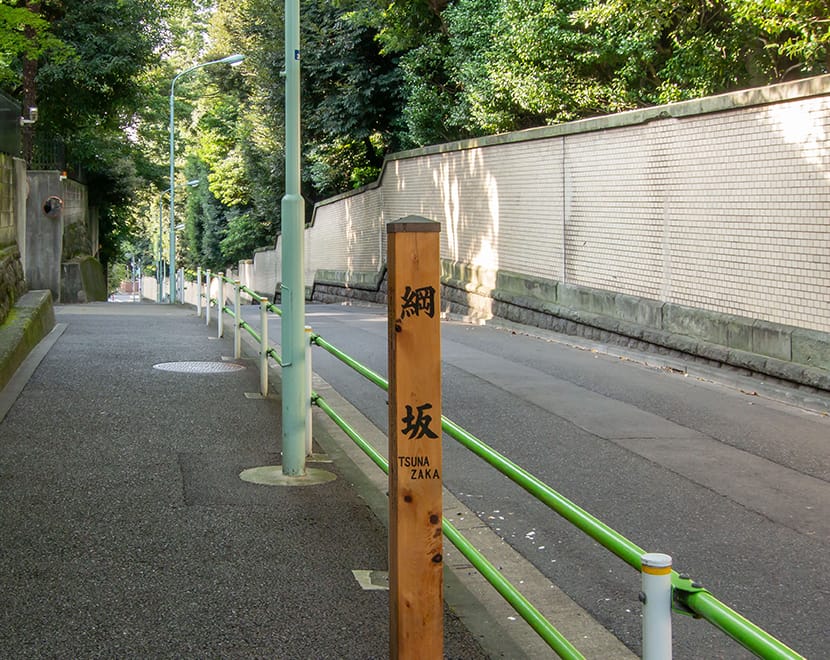
Music Notes
This piece is one of TACHIBANA Kyokusō’s last compositions. He was the founder of the Tachibana-school and the teacher of the late YAMAZAKI Kyokusui. YAMAZAKI was for him the exemplary performer in his later life, and it is said that he set this ballad to music with her voice and her remarkable talents in mind.
YAMAZAKI had a dark, somber voice which she ironically described as “rusty”. This might be why the composer emphasized a vocal style, which the biwa-players call katari (narrative) — as opposed to uta” (lyric). While katari and uta are two traditional categories in musicological writing about Japanese vocal styles, nonetheless, the performers’ understanding of these categories varies according to genre.
The emphasis on the katari-style is obvious by the complete lack of a nagashi, which is the epitome of the lyrical uta-style. This abstention from melodic bravura yielded the use of an extended expression-enhancing effect of the biwa: the usual texture of biwa-narration is the alternation of sung text-lines with interludes. Only in the nagashi are the biwa and the voice simultaneously combined.
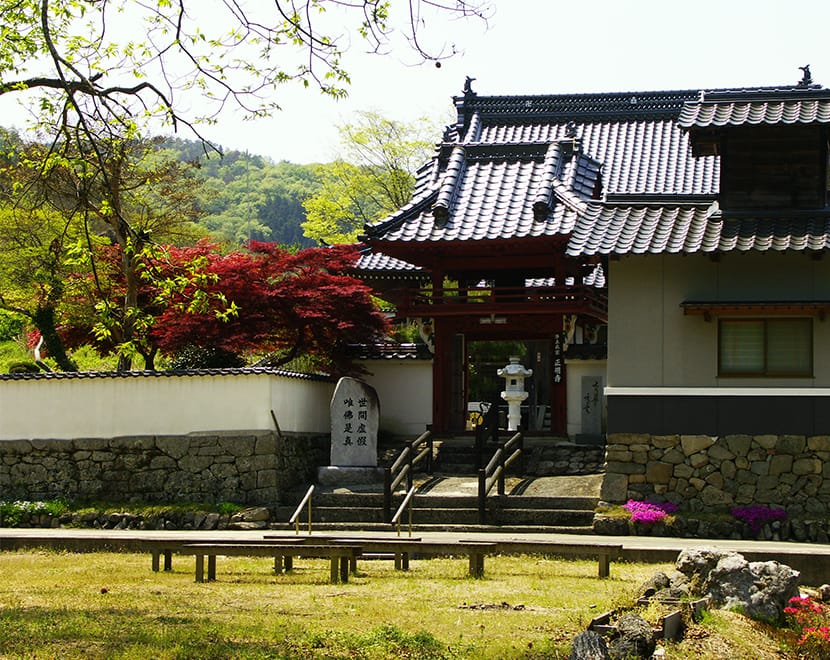
Another form of underlying a sung text with biwa-accompaniment is the so-called okuri. This is a rhythmic pattern in which the 1st and 3rd string are struck in alternation donn-dere-donn-dere-donn — to provide a background for one or two expressive text lines. In this piece, however, this pattern is used for seven lines (lines 74-80), and enhances the tension of the scene in which the ogre fixes on the severed hand, grabs it and flees through the roof. The okuri‘s increasingly agitated flow leads between the lines 78/79 to a complete dramatic interlude. But again, with the completion of this interlude, the okuri reappears under line 80, and after the line’s end, it finally pours forth into the sumptuous instrumental drama of the interlude chō no ni.
